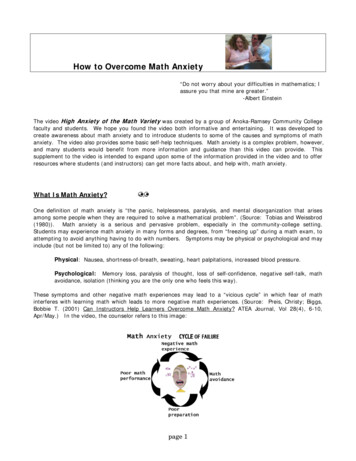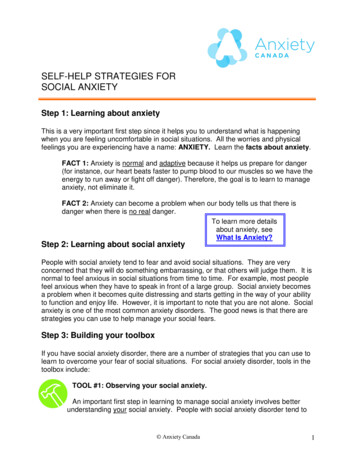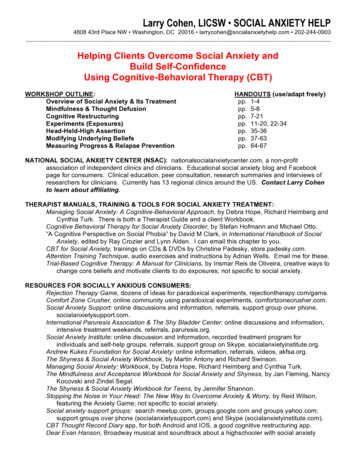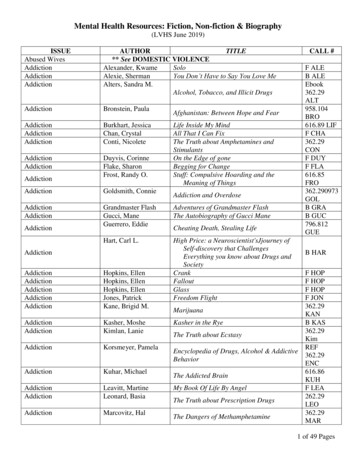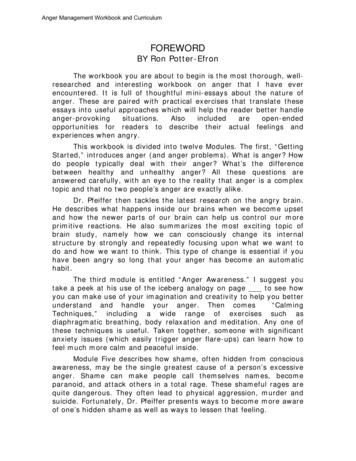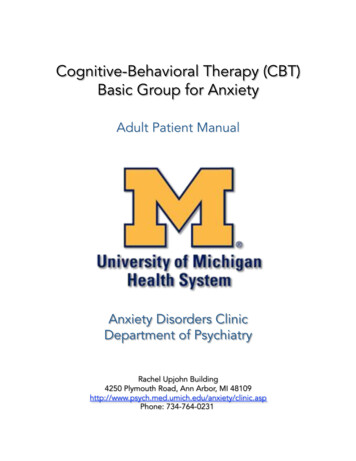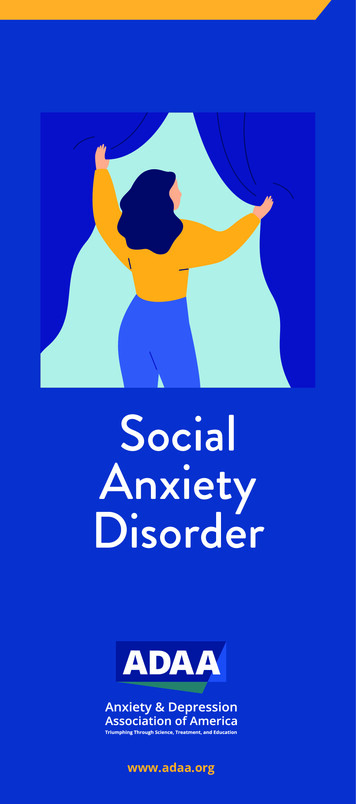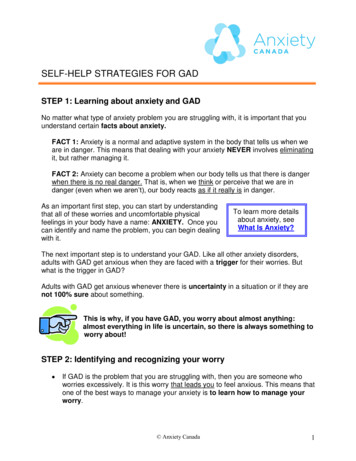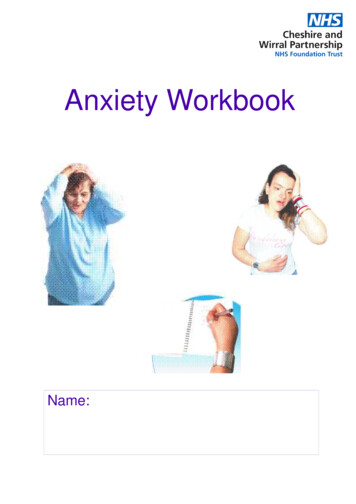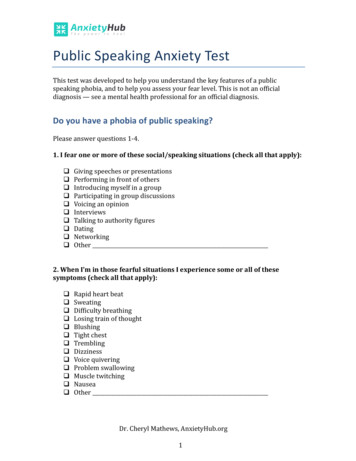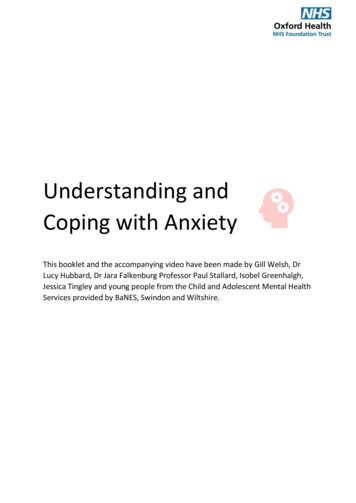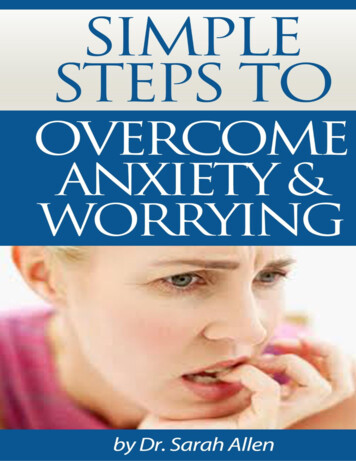
Transcription
Simple Steps ToOvercome Anxiety& WorryingBy Dr. Sarah Allen
Simple Steps Stop Anxiety & WorryingTABLE OF CONTENTSINTRODUCTION.4STEP 1 – BREATHE. .5Fight or Flight Response .5Relaxation Response .6How to Do Paced Breathing .7How to Cope With Racing Thoughts .8STEP 2 – REDUCE EVERY DAY STRESS.10Effects of Stress .10When People Make You Angry . .11When You Are Upset By Arguments . .12STEP 3 – LOOK AFTER YOURSELF. YOU ARE IMPORTANT TOO!.13Get More Sleep .13Exercise – It Really Does Help .15The Relationship between Food & Mood .17Should You Try Medication? .19STEP 4 – HOW COGNITIVE THERAPY HELPS DECREASE WORRYING.20When Your Worry Is Not Solvable .21When Your Worry Is Solvable .22Stop Worrying By Questioning Your Thoughts .23ABOUT THE AUTHOR .26Page 3 of 25Copyright 2014 Dr. Sarah Allen all rights reserved.Please do not copy or distribute.www.drsarahallen.com
Simple Steps Stop Anxiety & WorryingHello,Thank you for downloading my booklet. If you have got this far you are probablyworrying about something. Have you always been a worrier or are you anxiousabout a specific thing? Either way, it is time to start doing something about it andchange the way you are feeling. I am here to help.When you feel overwhelmed, stressed and worried, life’s challenges, big or small, are a lot harder tomanage. When clients first come in to see me, the main concerns that come up again and again are:1. What should I do when I get really anxious about something?2. How can I feel less stressed in my everyday life?3. What lifestyle changes can help improve how I feel?4. How can I stop my mind from going over and over something that has happened in the past?5. How can I stop worrying about everything: my children, partner, friends, work, my “to do” list .In this booklet I have highlighted areas of your life where you can make small changes, which addedtogether result in big changes in your mood. You won’t be able to do all these things I suggest in thereport at once, but adding one or two small changes a day to your routine can really help to reduceworry and make life more enjoyable.Page 4 of 25Copyright 2014 Dr. Sarah Allen all rights reserved.Please do not copy or distribute.www.drsarahallen.com
Simple Steps Stop Anxiety & WorryingStep 1 – Just BreatheIn small doses, stress can actually be useful as it helps you to stay focused, alert and increases energy.But when stress becomes chronic, it can damage your health, your mood, your relationships, andyour overall quality of life. Stress is sneaky! It can easily creep up on you so that being frazzled andoverwhelmed starts to feel normal. You may not even recognize how much it is affecting you so it isreally important to recognize the signs and symptoms of stress and then take steps to stop feeling sooverwhelmed.The Fight or Flight Response:When we worry or become anxious, our sympathetic nervous system is triggered. You have probablyheard of the Fight or Flight response. This is where adrenaline floods though our body to gear us upto either run away or fight the object causing us to be scared. No one feels all of the physical effectsshown below, but we tend to experience the same few ones such as: An increase in heart rate Your breathing speeds up, you may feelbreathless, a choking feeling or heaviness inyour chest Muscles feel tense, achy or shaky You feel hot and maybe sweaty You become lightheaded Your vision may become blurred Butterflies or cramps in your stomach or anurge to go to the toilet Your thoughts race so you can’t think straightPage 5 of 25Copyright 2014 Dr. Sarah Allen all rights reserved.Please do not copy or distribute.www.drsarahallen.com
Simple Steps Stop Anxiety & WorryingOriginally our bodies were flooded with adrenaline to enable us to fight or run away when faced withdanger. We don’t usually have to physically fight people anymore or run from danger (not manybears around here!) so we now find that this physical response is activated in situations where it isn’tappropriate like in traffic jams or during a stressful day at work. The physical sensations it generatesleaves us agitated, anxious or angry because we are not physically releasing it.The Relaxation Response:The physical responses to adrenaline do eventually go down by themselves but experiencing thisanxiousness and agitated state feels unpleasant so the way to counteract these feelings quickly is toengage our parasympathetic nervous system by deep breathing.Basically, deep breathing and adrenaline can’t co-exist in the same body.Deep breathing triggers the stimulation of the Vagus nerve—anerve running from the base of the brain to the abdomen, thatemits a useful neurotransmitter (acetylcholine) that dampens ournervous system, lowering heart rate, relaxes muscles and mostimportantly, stops your thoughts from racing so you can thinkstraight. In effect, the relaxation response is the anti-fight orflight response!So How Do We Get This Relaxation Response?The relaxation response is activated by doing paced breathing which involves taking smooth, slow,and regular breaths. Sitting upright is usually better than lying down or slouching, because it canincrease the capacity of your lungs to fill with air. It is best to ‘take the weight’ off your shoulders bysupporting your arms on the side-arms of a chair, or on your lap. Print out the next page and keep ithandy.Page 6 of 25Copyright 2014 Dr. Sarah Allen all rights reserved.Please do not copy or distribute.www.drsarahallen.com
Simple Steps Stop Anxiety & WorryingHow To Do Paced Breathing:1. Take a slow breath in through the nose, breathing into your lower belly so you feel itinflate like a balloon (for the count of 4)2. Hold your breath for 1 or 2 seconds3. Exhale slowly through the mouth so that you are pushing out the air in the “balloon”and you feel your belly suck in (for the count of 5)4. Make sure the exhale breath is one or two counts longer that the inhale breath asthis activates a greater relaxation response.5. Wait a few seconds before taking another breathAbout 6-8 breathing cycles per minute is often helpful to decrease anxiety, but findyour own comfortable breathing rhythm.A lot of my clients have reported that they find thistechniques works even better if you increase the numberPractice, Practice, Practice:You do not need to beof breaths each time:feeling anxious to practiceFirst breath – inhale for the count of 4, exhale for thepaced breathing – in fact, atfirst you should practicecount of 5Second breath – inhale for the count of 5, exhale forwhile feeling relatively calm.You’ll gradually master thisthe count of 6Third breath – inhale for the count of 6, exhale for thecount of 7Start from the count of 4 again and repeat the cycle.Page 7 of 25Copyright 2014 Dr. Sarah Allen all rights reserved.Please do not copy or distribute.www.drsarahallen.comskill and feel the benefits!
Simple Steps Stop Anxiety & WorryingUse this technique next time you feel really anxious about something. It is even effective if you areexperiencing a panic attack.Summary:1.We experience a trigger thought e.g. – “Something bad isgoing to happen”, “I’m not going to be able to cope”.2.We then have a body reaction due to the fight or flightresponse.3.Do paced breathing to activate the relaxation response.4.Say to yourself – “I can cope with these feelings, I’ve gotthrough it before. This will pass”.The purpose of calm breathing is not to avoid anxiety at all costs, but just to takethe edge off or help you “ride out” the feelings so that when you feel calmer youcan use the strategies we talk about later to challenge the thoughts and thingsyou do or don’t do that are unhelpful to you.How to Cope With Racing ThoughtsDo your thoughts race? Is it always or occasionally? Thoughts can start off triggered by a specificsituation or worry and then become a string of confused and racing ideas. This can be overwhelming,confusing and distressing and racing thoughts can hinder your ability to concentrate and accomplishdaily tasks. They can also affect your memory and quality of sleep.Page 8 of 25Copyright 2014 Dr. Sarah Allen all rights reserved.Please do not copy or distribute.www.drsarahallen.com
Simple Steps Stop Anxiety & WorryingPaced breathing can help when your thoughts are racing and another useful technique to try is calledgrounding. When we worry, we spend too much time thinking. Grounding helps you get out of yourbrain and bring your focus to your body. Close your eyes and focus on your breath. Notice how yourbody feels sitting in the chair. Push your feet on the ground and feel the energy draining from yourmind, down your body and through your feet in to the ground. Use all your senses. What can youfeel with your hand? What can you hear? Open your eyes and focus on something in the room.What do you see? Feel your breath as it travels up your nose, fills up your chest and comes out ofyour mouth.Allow your thoughts to come and go. Just because you think something it doesn’t mean it is true orwill actually happen. Allow your thoughts to be separate from you. Avoid judging or responding toyour thoughts, just observe them as they run through your mind, turning down their volume so youcan focus on your other senses.You can follow this link to listen to a guided visualization that imagines leaves floating on the surfaceof a stream. For each thought that comes to mind, allow that thought to take its place on a leaf andfloat down the stream. Allow those thoughts to come and go, you don’t need to respond to them.drluoma.com/leaves meditation.Progressive muscle relaxation (PMR) is another very helpful technique in calming your mind andrelaxing your body. PMR involves tensing specific muscle groups and then relaxing them to createawareness of tension and relaxation. It is termed progressive because it proceeds through all majormuscle groups, relaxing them one at a time, and eventually leads to total muscle relaxation. A relaxedbody results in a calm mind. If you come in to see me I can give you a CD that has a 20 minuteprogressive muscle relaxation as well as a short 7 minute relaxation exercise and a 10 minute beachvisualization. You can also click the link below to watch a short PMR on-soothes-stress-videoPage 9 of 25Copyright 2014 Dr. Sarah Allen all rights reserved.Please do not copy or distribute.www.drsarahallen.com
Simple Steps Stop Anxiety & WorryingStep 2 – Reduce Everyday StressSometimes life is more stressful than at other times, usually when you have to juggle many things atonce. I like to think of it as we have a bucket of stressors. Throw this stress in and we are fine, throwin a couple of more stressors and we are just about okay, but it is that last thing that comes alongthat makes your ‘stress bucket’ over full and everything gets totally overwhelming. We need to lookat all the things you have in your ‘stress bucket’ and see what we can get rid of so the things we can’tchange are more manageable.The table below shows the many negative effects stress can have on your mind and body.Effects of StressBrain Effects Mood EffectsMemory problemsInability to concentratePoor judgmentSeeing the negative rather than positiveConstant worryingAnxious or racing thoughts Physical Effects Aches and painsFrequent illnessesDiarrhea or constipationNausea, dizzinessChest pain, racing heartbeatLoss of sex driveMoodinessIrritability or short fuseAgitation, inability to relaxFeeling overwhelmedDepression or generalunhappinessSense of loneliness and isolationBehavioral Effects Changes in eating habit (more or less)Changes in sleep habits (too much or toolittle)Isolating yourself from othersProcrastinating or neglecting responsibilitiesNervous habits (e.g. nail biting, pacing)Using alcohol, cigarettes or drugs to relaxPage 10 of 25Copyright 2014 Dr. Sarah Allen all rights reserved.Please do not copy or distribute.www.drsarahallen.com
Simple Steps Stop Anxiety & WorryingYou may feel like the stress in your life is out of your control, and it’s true, sometimes you can’tcontrol situations or the way other people act. But you can take charge: take charge of your thoughts,your emotions, your schedule, your environment, and the way you deal with your problems.Doing nothing will only make problems worse!We humans are social animals and we usually like to be with other people. Unfortunately, otherpeople can often be the source of our stress. Here are a couple of situations that often come up.What to Do When People Are Making You AngryWhen people stress us out, we often feel frustrated andangry. As we talked about before, when you are stressedadrenaline runs through your body and one effect of that isthat your thoughts race. Racing thoughts make thinkingclearly difficult and that is when you are more likely to lashout and say things you don’t mean.Doing a quick breathing exercise clears your thoughts and lets you take a time out so you can comeback to the situation and deal with it calmly. This usually means you will get a better response fromthe other person and a better outcome overall.Prevent losing your cool by breathing and squeezing the tips your thumb and middle fingertogether. Now breathe outPageslowlyand11 of25relax your tense hands.Copyright 2014 Dr. Sarah Allen all rights reserved.Please do not copy or distribute.www.drsarahallen.com
Simple Steps Stop Anxiety & WorryingI don’t mean that you should always push down your anger and ignore what is bothering you.Driving your feelings underground only forces them to pop up again, bigger and uglier, atinappropriate times and places and usually towards someone that doesn’t deserve it. Better to usethe above technique to calm down and then tackle the issue with good communication skills whichbrings me to me next tip.What to Do When You Are Upset By Arguments with Other PeopleDisagreements can be dealt with more quickly by usinggood communication skills such as stating your needs ordistress directly (not expecting the other person tomind-read) and avoiding "you always" or "you never"(these statements always make the other persondefensive and more likely to continue arguing).Use “I” language instead, i.e. "I feel when you . "; "I would really appreciate it if youcould . "; "I need some help in ”. It also helps to stick to the present disagreementand not bring in past hurts. These communication tips aren’t just for our partner. They work well withour children, friends and acquaintances too.As you can see, reducing stress in your life is really important in improving your overall mood. Stressis also the number one cause of insomnia so we will spend quite a lot of time talking about that in mynext section.Page 12 of 25Copyright 2014 Dr. Sarah Allen all rights reserved.Please do not copy or distribute.www.drsarahallen.com
Simple Steps Stop Anxiety & WorryingStep 3. Look After Yourself – You Are Important TooThere is a huge connection between our physical health and our mental health. The following sectionon how to look after yourself can also be found in my booklet Simple Steps to Overcome Depressionso if you have downloaded both booklets you will notice that the information here is repeated butthat is because looking after yourself really helps improve your mood, whatever negative emotionyou are experiencing. If you have already read this and want to jump to Step 4 – How CognitiveTherapy Helps To Decrease Worrying, go to page 19.Get More Sleep!Getting more sleep sounds easy in theory, but so many people find it hard to achieve. The averageamount of sleep needed by adults for their body and mind to be fully rested is around seven to eighthours a night. This of course can vary but you know you aren’t getting enough when your mood isnegatively affected.Lack of sleep can stop you thinking clearly, wrecks productivity and can alter your mood significantly.According to the National Sleep Foundation (NSF) the “walking tired” anger more easily, haveproblematic relationships and are less likely than those who sleep well to exercise, eat healthfully,have sex and engage in fun leisure activities; allbecause they are too tired.What with work, errands and seeing to your family’sneeds, you have so much to do that you can only getthem done by staying up late. Maybe going to bed inthe wee hours is the only way to get some “metime”.Page 13 of 25Copyright 2014 Dr. Sarah Allen all rights reserved.Please do not copy or distribute.www.drsarahallen.com
Simple Steps Stop Anxiety & WorryingStaying up late is probably not working for you though andimproving your sleep is one of the best ways to improveHere Are Some Ways To Relaxthe quality of your life. We need to work on being eithermore organized or less perfectionist about getting thingsdone, knowing it’s okay to ask and expect help, and Have a warm bath (not hot) as this willhelp your body reach a temperaturethat's ideal for rest.knowing it is totally necessary to have “me time”. But notat the expense of sleep!In the meantime, we need to work on setting up a goodnight-time routine. Our every day “to do list” is much less Writing “to do” lists for the next daycan organize your thoughts and clearyour mind of any worrying thoughtsthat pop in to your head (more aboutthat later )daunting when we are refreshed!The National Sleep Foundation states “It’s not uncommonfor people who don’t get enough sleep to be depressed orfor people who are depressed to not sleep well enough.” Relaxation exercises, such as light yogastretches, help to relax themuscles. Don't exercise vigorouslythough, as it will have the oppositeeffect.This is very ‘chicken and the egg’. Who knows which comesfirst, but what we do know is that over time, impairedmemory, mood and other functions become a chronic wayof life. In the long term, this can affect your job or Relaxation CDs can help as they use ahypnotic voice to guide you throughmuscle relaxation and soothing musicand sound effects to relax your brain.relationships.So how can we improve sleep? Firstly, keep regularsleeping hours. A bedtime ritual teaches the brain tobecome familiar with sleep times and wake times andprograms the brain and internal body clock to get used to a Watching TV or any computer or phonescreen keeps the brain engaged andactive so it is harder to fall asleep. It isbetter to read a book or listen to theradio as that relaxes the mind bydistracting it from the present worries.set routine. Most adults need between six and nine hoursPage 14 of 25Copyright 2014 Dr. Sarah Allen all rights reserved.Please do not copy or distribute.www.drsarahallen.com
Simple Steps Stop Anxiety & Worryingof sleep every night. By working out what time you need to wake up, you can work backwards and seta regular bedtime schedule.Secondly, you can’t expect to “go, go, go”, then be able to fall straight to sleep. Winding down is acritical stage in preparing for bed.Perhaps the most important thing to remember in gettingenough sleep is that your needs are important and putting yourneed for sleep above the demands of others is the kindest thingyou can do for yourself and those who are important to you.Insomnia can often be caused by lying awake worrying which brings me to the next step I think it isimportant to work on in order to improve your mood.Exercise – It Really Does Help To Boost Your MoodI know you know that exercise is good for you and maybe you already exercise, but if you don’t hereare 7 reasons why exercise helps you feel happier: Just 20 minutes of exercise a day will calm your mind and lower stress hormones. Exercise boostsendorphins and serotonin levels as well as other brain chemicals that improve your mood. Physical activity is being increasingly recognized as an effective tool to treat depression asresearch has shown that 30 minutes of exercise a day x 5 days a week same positive moodeffects as taking an antidepressantsPage 15 of 25Copyright 2014 Dr. Sarah Allen all rights reserved.Please do not copy or distribute.www.drsarahallen.com
Simple Steps Stop Anxiety & Worrying New research has taken the connection one step further, finding that moderate exercise canactually prevent episodes of depression in the long term. Exercise helps you gain confidence - Meeting exercise goals or challenges, even small ones, canboost your self-confidence. It can take your mind off worries. Exercise is a distraction that can get you away from the cycle ofnegative thoughts that feed anxiety and depression. Can lead to increased social interaction. Exercise may give you the chance to meet or socializewith others. Just exchanging a friendly smile or greeting as you walk around your neighborhoodcan help your mood. Helps you cope in a healthy way. Doing something positive to manage anxiety or depression is ahealthy coping strategy. Trying to feel better by drinking alcohol, dwelling on how badly you feel,or hoping anxiety or depression will go away on its own can lead to worsening symptoms.So tell me again why you’re not exercising? And before yousay it’s because you don’t have enough time, go back to theprevious section that stresses that you need to prioritize yourneeds. If it’s because you don’t like exercising, I think youprobably just haven’t tried the right activity yet. Exercisedoesn’t have to be just running on a treadmill. Also, onereason exercise works is because it heats up our bodies andthat increases serotonin levels. Having a nice long shower orsoak in the bath does that too, therefore, on days you can’texercise a relaxing bath is a good alternative.The Relationship between Food & MoodPage 16 of 25Copyright 2014 Dr. Sarah Allen all rights reserved.Please do not copy or distribute.www.drsarahallen.com
Simple Steps Stop Anxiety & WorryingWe have discussed how sleep and exercise influence our mood and the third important factor intaking care of our physical needs is all about what we eat.Feeling Cranky? You Need Fuel!Did you snap at your kids and the telemarketer on thephone? Crankiness can be a sign that your body needs fuel.Just like our kids, when our blood sugar levels drop, so doesour mood. Just be sure to refuel the right way: with foodsthat don’t leave you with a blood sugar crash an hour later. Agreat way to blast irritability is to eat combination foods ateach meal and snack time. This means combine foods thatcontain a carbohydrate with either some protein or some fat.Carbohydrates are a great source of energy that quickly burnsout so adding some fat or protein will slow the digestion process, causing your sugar and energylevels to remain stable for a longer amount of time. A great example of a combination snack is anapple with peanut butter. The apple is your healthy complex carbohydrate and the peanut butter is ahealthy fat.Feeling Stressed? Bring Out the Chocolate (Yay!!!)Stress is building, so what can calm you down fast? Experts say thatchocolate—particularly dark chocolate—may help reduce the stresshormones that are swarming in your body. A study by Swissresearchers found that eating just a small bite of dark chocolate (about 1.4 ounces) has the power tolower the stress hormones cortisol and catecholamines in the body. Chocolate also increasesserotonin levels reducing your anxiety. So, go on, treat yourself.Page 17 of 25Copyright 2014 Dr. Sarah Allen all rights reserved.Please do not copy or distribute.www.drsarahallen.com
Simple Steps Stop Anxiety & WorryingFeeling Sad or Anxious? Go Fish There are many studies going back to 1998 that showhow omega-3 fatty acid deficiency correlates with anincreased rate of both anxiety and depression. Braincell membranes are made up partly of omega-3s so itis possible that increasing omega-3 levels throughfood makes it easier for serotonin to pass through cell membranes. Research still needs to be doneon the exact mechanisms involved but we do know that omega-3 does affect the membranes andchanges cell functioning. The best sources of omega oils are cold water fish, eggs, nuts and fish oilsupplements. Flax oil supplements are also good for vegetarians to increase their omega levels. Aswith all supplements, ask your doctor first to make sure there are no adverse reactions with currentmedications before trying fish oil. Also, there are some studies that show no change from takingomega oil, but it is worth trying it for yourself for a few weeks and seeing if you notice any benefits.Should You Try Medication?For mild to moderate anxiety, talk therapy has been shown to be more effective than medication anddoes not have the intrusive negative physical side effects. Patients treated with cognitive therapy aremore likely to get better than with other types of therapy and many studies have reported thatpatients using therapy vs. medication show more positiveimprovements at 12 months and longer post therapy.However, when I work with someone who can see that the copingstrategies we are talking about in therapy are a great idea but theiranxiety is so high that they are not able to make any changes, IPage 18 of 25Copyright 2014 Dr. Sarah Allen all rights reserved.Please do not copy or distribute.www.drsarahallen.com
Simple Steps Stop Anxiety & Worryingoften suggest having a consultation with a psychiatrist and used together, therapy and medicationcan really work well in lifting you to a place where you can utilize the strategies we are discussing.Specifically, antidepressants help reduce the extreme feelings of sadness, hopelessness, and lack ofinterest in life that are typical in people with anxiety.Taking antidepressants can get you to a level where you can start to do things and think about thingsdifferently. If you don’t make changes to your situation, coping skills, relationships etc. when feelingbetter on antidepressants though, it is likely that the anxiety will come back when you stop themedication.I see antidepressants as one of the many useful tools to use to get back to feeling back in control ofyour life and I work with good psychiatrists whoprescribe the appropriate medications while I do the talktherapy (cognitive therapy). Medications do have sideeffects though and the benefits have to be weighedagainst the cons for on an individual basis as everyoneresponds differently. The most important thing is towork with someone who is experience and they willknow how best to help you.Step 4 – How Cognitive Therapy Helps To Decrease WorryingSo why do we worry about things? Worries bother us. We can’t sleep or concentrate because wehave pessimistic thoughts going round and around in our head, but in a way, worries make sense asthey pull us in to a false sense of feeling in control. We’re doing something, even if it is just worrying.You continue to worry because our mind thinks:Page 19 of 25Copyright 2014 Dr. Sarah Allen all rights reserved.Please do not copy or distribute.www.drsarahallen.com
Simple Steps Stop Anxiety & Worrying Maybe I'll find a solution. I don't want to overlook anything. If I keep thinking a little longer, maybe I'll figure it out. I don't want to be surprised. If I consider all the possible outcomes I’ll be more in control whensomething bad happens.We can have a hard time giving up on ourworries because, in a sense, our worries havebeen working for us.So now I’ve pointed that out, let’s just stop worrying then! Unfortunately, telling yourself to stopworrying doesn’t work for long. You can distract yourself or suppress the thoughts, but they keeppopping back up.Instead I would like you to distinguish between whether your worry is solvable or not. Ask yourselfthe following questions:Is this situationsomethingI have no controlover?Is thissomething Ican take actionover?Page 20 of25 you are worrying about something.Here are some good questions to ask yourselfwhen Is the problemCopyright 2014 Dr. Sarah Allen all rights reserved.Please do not copy or distribute.something you’recurrentlyfacing? Is it anwww.drsarahallen.comimaginary what-if ormaybe it is something that is in the past and has already happened?
Simple Steps Stop Anxiety & WorryingLearning To Accept Difficult Feelings When Worry Is Not SolvableIf the problem is in the past then you have to decide whether to say something to the personinvolved or do nothing and accept what happened. If the worry isn’t something you can solve, youhave to do nothing and practice acceptance. That doesn’t mean it doesn’t feel bad though. In suchcases, it’s important to tune into your emotions. Your brain is so busy going over and over pretendconversations with the person that caused the hurt that it gives a temporary sense of control thatsomething is being done. But it’s not really allowing you to get over it and it doesn’t allow you time tofeel.The only way out of this is by embracing your feelings. Sometimes we just can’t control events andwe have to embrace uncertainty. Sometimes we are hurt and angry but there is nothing that can bedone, but feel our emotions. You are in control. You are deciding to feel your feelings so you caneventually let it go.What to Do When the Worry Is SolvablePage 21 of 25Copyright 2014 Dr. Sarah Allen all rights reserved.Please do not copy or distribute.www.drsarahallen.com
Simple Steps Stop Anxiety & WorryingIf the worry is solvable we can use Active Worrying. This is where worrying serves a purpose. Forexample we worry about a deadline at work and that motivates us to get the project done. It is reallyimportant to differentiate between a worry that can be solved and one tha
Simple Steps Stop Anxiety & Worrying Page 6 of 25 Copyright 2014 Dr. Sarah Allen all rights reserved.
